The Indian Coffee Story :
Brewing Harmony
The Saga of Indian Coffee and Its Dance with Ecology
17th December 2023
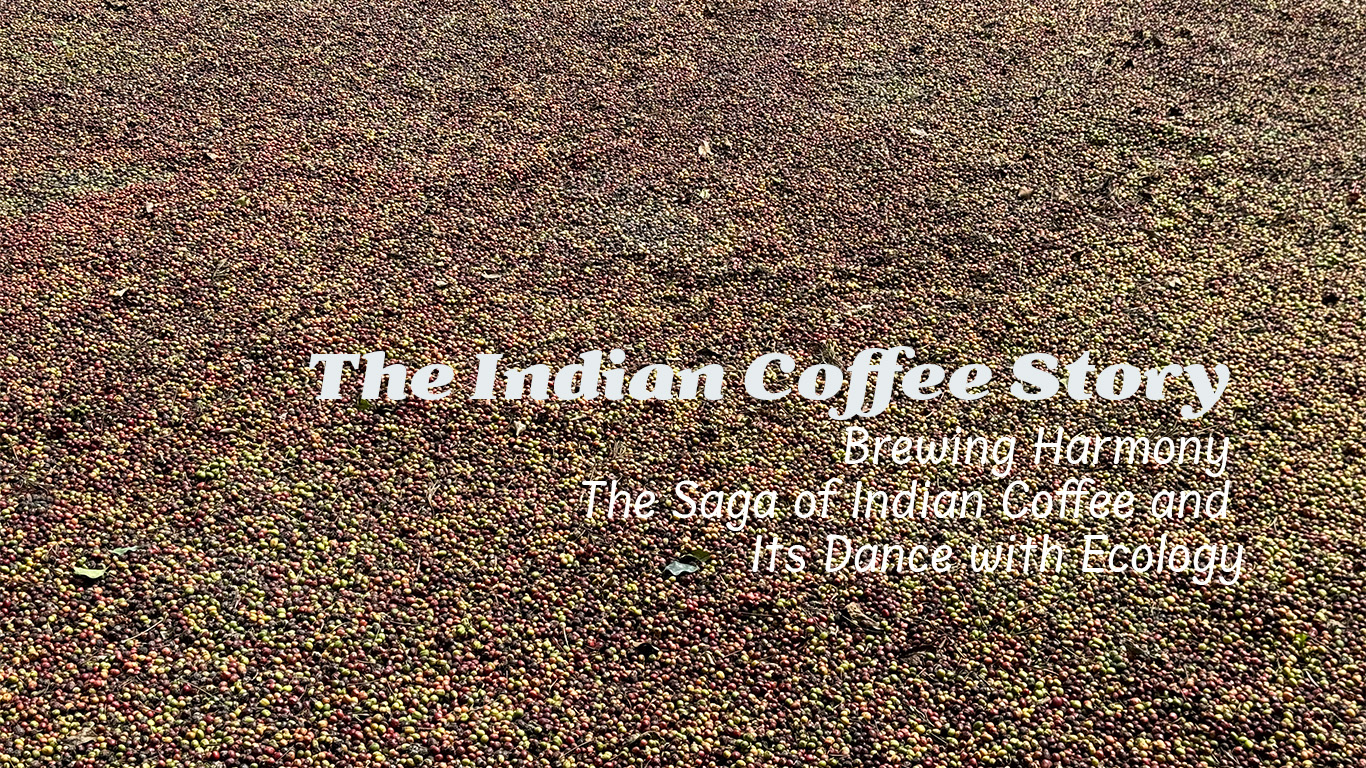
India’s Rich Coffee Heritage: A Sensory Journey
The story of Indian coffee is as rich and diverse as the land itself. Nestled in the misty hillsides of Chikmagalur to Coorg, where coffee cultivation in India began in the 17th century, the journey of Indian coffee is a sensory feast. The aroma of freshly roasted beans fills the air, a testament to a tradition that dates back centuries. This journey intertwines with the tales of Baba Budan, a legendary Sufi saint who, as legend has it, smuggled seven coffee seeds from Mecca and planted them in these very hills. This act marked the inception of coffee cultivation in India, a pivotal moment that would forever change the landscape of Indian agriculture and culture.
The story of Indian coffee isn’t just about the beans or the brew; it’s deeply rooted in the fabric of Indian society. From the monsoon rains in Coorg that nourish the plantations to the bustling markets where ‘kaapi’ is more than just a drink, it’s a cultural phenomenon. Coffee in India isn’t merely consumed; it’s experienced, with each sip encapsulating the essence of its rich history and the diversity of its land.
Colonial Expansion and Environmental Challenges
The coffee saga in India took a significant turn with the arrival of the British East India Company. The once-mystical beans, smuggled by Baba Budan, became the centrepiece of a large-scale colonial agricultural endeavour. Sprawling plantations replaced the lush rainforests, leading to a host of environmental issues such as soil erosion, water depletion, and a decline in biodiversity. The enchanting aroma of coffee is now mixed with the bitter aftertaste of ecological imbalance.
However, it’s not just the past that poses challenges; the present scenario of coffee production is equally complex. The industry faces the dual threat of maintaining its rich heritage and meeting the evolving demands of a global market that increasingly values sustainability and environmental stewardship.
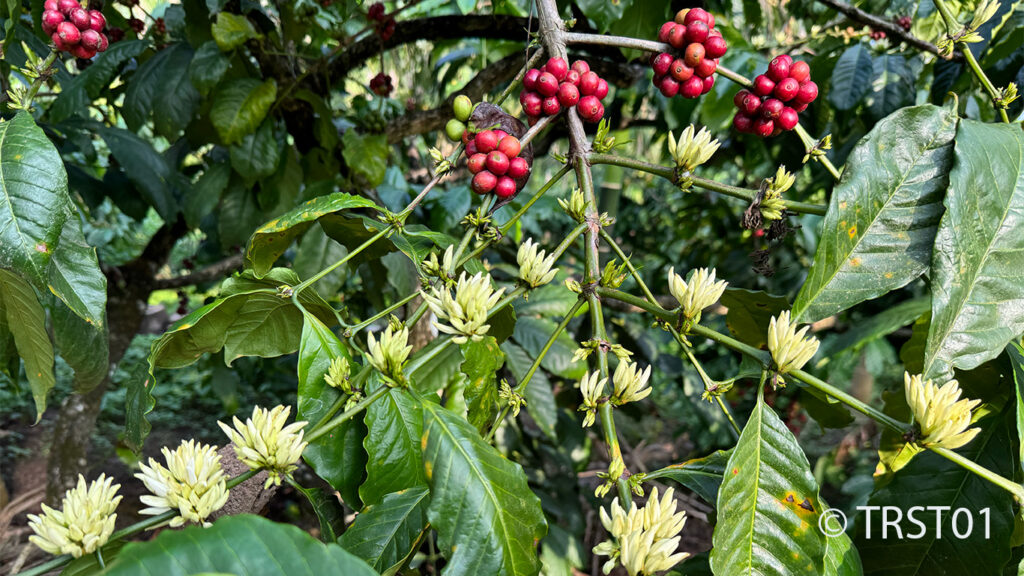
The Monsoon Magic and the Green Revolution
Despite these challenges, hope emerged with the arrival of the monsoons, crucial in defining the unique flavor profile of Indian coffee. The winds and rains from the Arabian Sea contribute to producing coffee beans with distinctive earthy and spicy notes. This exceptional terroir, combined with the advent of sustainable farming practices in the late 20th century, marked a new era for Indian coffee.
The common misconception that coffee plantations in India contribute significantly to deforestation overlooks a critical aspect of Indian agriculture: the adoption of sustainable farming practices by coffee farmers. In India, coffee cultivation has evolved to become more eco-friendly and sustainable. Indian farmers have been increasingly embracing methods like shade-growing, agroforestry, and organic farming. These practices reflect a deep understanding of the delicate balance required to maintain ecological harmony.
Shade-Growing Coffee: A Harmony Between Nature and Cultivation
Shade-growing is a method where coffee is cultivated under a canopy of trees. This traditional technique has numerous ecological benefits. The tree canopy provides a habitat for a diverse range of flora and fauna, thereby maintaining biodiversity. It also ensures that the soil remains fertile and less prone to erosion, as the tree roots help bind the soil. Furthermore, the shade from the trees protects the coffee plants from direct sunlight, reducing the need for excessive irrigation and mitigating water stress.
Agroforestry: Integrating Agriculture and Forest Ecosystems
Agroforestry, another sustainable practice, involves integrating trees and shrubs into crop and animal farming systems. This approach creates a more diverse, productive, and sustainable land-use system. In coffee plantations, agroforestry helps create a microclimate conducive to coffee growth while preserving natural resources. Integrating diverse plant species in coffee plantations helps maintain soil health and assists in carbon sequestration, thereby playing a role in combating climate change.
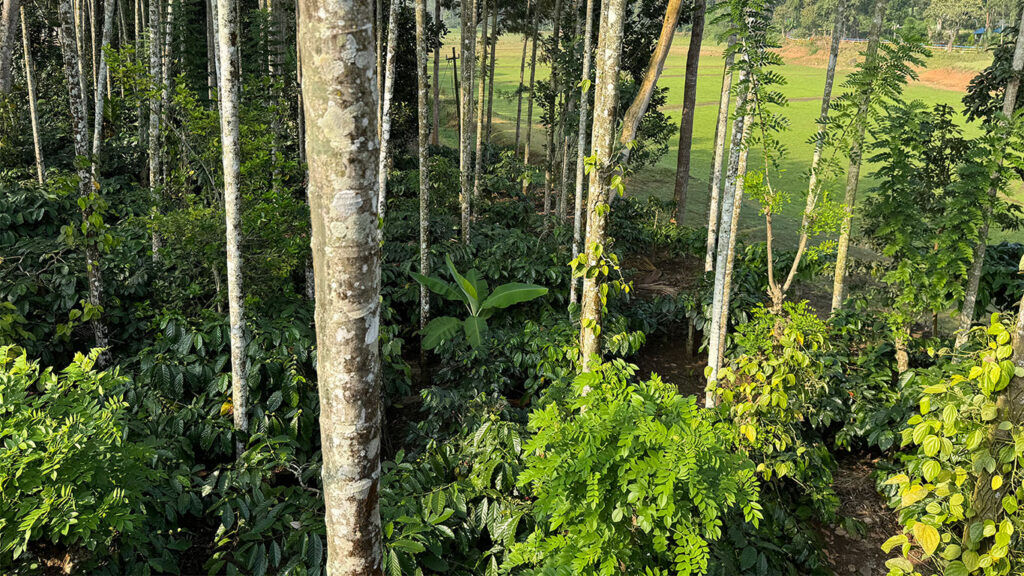
Organic Farming: The Eco-Friendly Approach
The shift towards organic farming is another significant move by Indian coffee farmers. This method excludes the use of synthetic fertilizers and pesticides, which are harmful to the environment. Instead, organic farming relies on natural processes and materials to enrich the soil and protect the crops. This approach not only makes the coffee healthier for consumption but also ensures that the farming process is sustainable and does not degrade the environment.
Reforestation Efforts: Reviving Lost Rainforest Cover
Contrary to the belief that coffee cultivation leads to deforestation, these sustainable practices have contributed to reforestation efforts. The enriched soil and increased tree cover have aided in the slow but steady process of restoring lost rainforest areas. These efforts demonstrate a commitment to environmental stewardship and highlight the role of Indian coffee farmers in preserving the ecological balance.
The sustainable practices adopted by Indian coffee farmers testify to their foresight and commitment to ecological conservation. These methods not only enrich the soil and maintain biodiversity but also ensure the sustainability of coffee cultivation in the long term. By integrating these eco-friendly practices, Indian coffee farmers are setting an example of how agriculture can coexist harmoniously with nature, debunking the myth of inevitable deforestation due to coffee plantations.
Diversity Beyond Arabica: Flavors and Sustainability
The Indian coffee narrative extends beyond the well-known Arabica to include a diverse array of Robusta and indigenous varieties. Each region, from Chikmagalur to Coorg, brings its unique terroir to the table, offering a kaleidoscope of flavours. This diversity is not just about taste; it’s also a testament to India’s commitment to sustainable practices. Farmers are increasingly turning to organic methods, reducing their reliance on chemicals and preserving the delicate ecosystem.
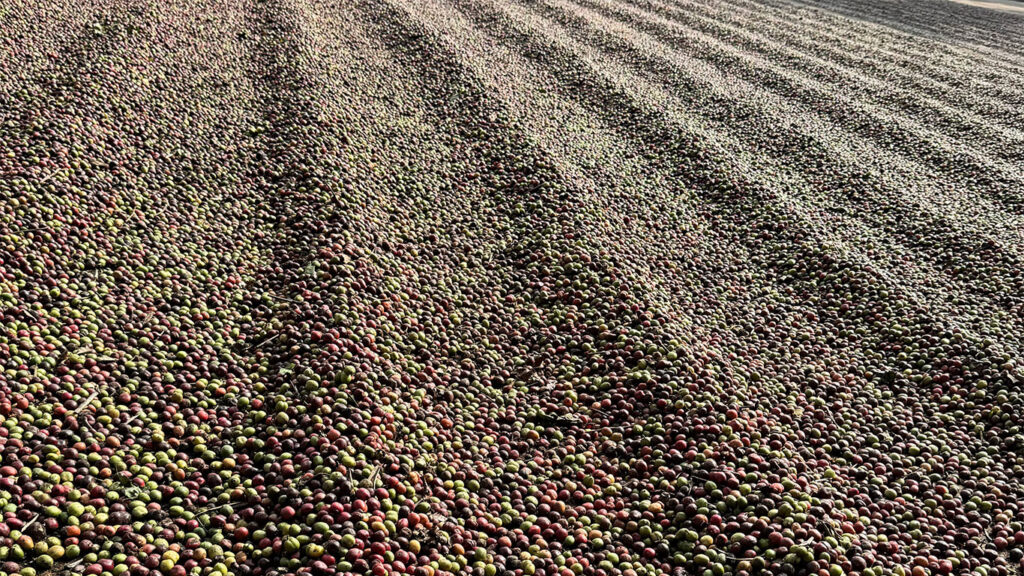
Coffee as a Cultural Tapestry
In India, coffee is more than a beverage; it’s a cultural artefact. South India’s ‘kaapi’ is a rich, frothy concoction that’s part ritual, part social glue. It’s not just about the drink; it’s about the experience – the warmth of the cup, the conversations that flow, and the connections that brew over each shared cup. In the north, the ‘chai-coffee’ blend offers comfort and a sense of belonging, transcending social and cultural barriers. Coffee in India is a unifier, a brew that brings people together.
The EUDR’s Mandate and Indian Coffee
The introduction of the European Union’s Deforestation Regulation (EUDR) presents a new challenge and opportunity for Indian coffee. This regulation requires all coffee entering the EU to be deforestation-free, a mandate that has significant implications for Indian growers and exporters. It creates a new paradigm where compliance with environmental standards is not just a good practice but a business necessity.

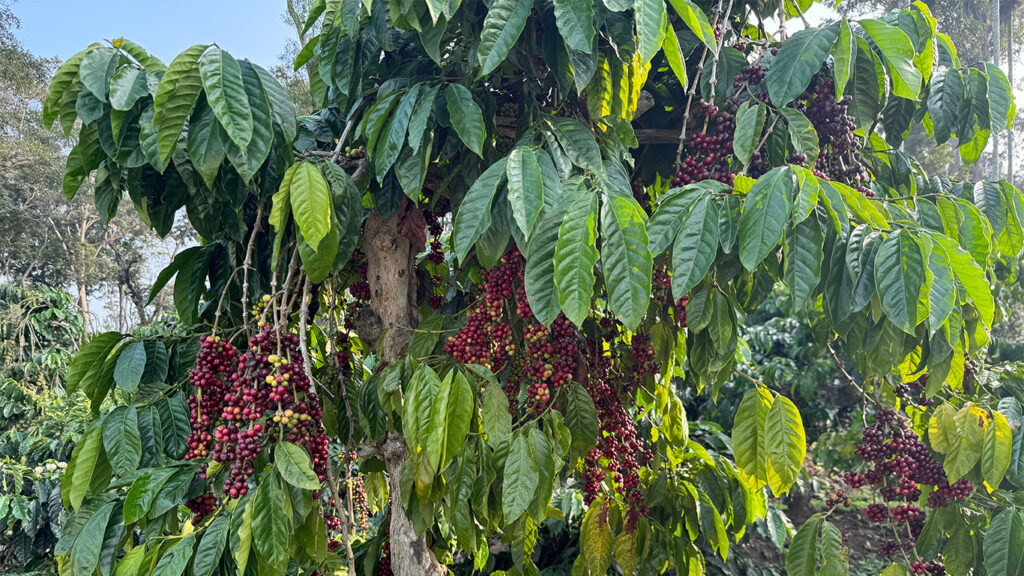
TRST01Chain: A Game-Changer in Compliance and Sustainability
In this new era of compliance and sustainability, TRST01Chain emerges as a vital tool for the Indian coffee industry. It represents a technological revolution, offering end-to-end traceability and ensuring that every coffee bean is traceable to an EUDR-compliant source. Its geo-tracking capabilities provide the necessary precision to analyze deforestation and guarantee beans are harvested from untainted lands. TRST01Chain is more than a compliance tool; it’s a commitment to sustainability.
From Bean to Cup: Ensuring Transparency and Ethics
The journey of coffee beans from the lush Indian plantations to the cups of coffee enthusiasts in Europe is now under the watchful eye of TRST01Chain. This platform ensures a transparent supply chain, keeping a record of every step, and guaranteeing that ethical practices are followed. It sets a benchmark for environmental sustainability and labour practices, creating a more equitable industry.
Environmental Impact and Market Potential
TRST01Chain goes beyond compliance; it’s a tool for environmental impact assessment. It allows growers to measure, monitor, and improve their sustainability practices, aligning with global efforts to combat climate change. This capability opens up new market opportunities, potentially leading to better pricing and positioning for growers in a market that increasingly values eco-friendly and ethically sourced products.

The Future of Indian Coffee: Balancing Tradition and Innovation
As the global coffee industry evolves, India’s coffee story is a fascinating blend of tradition and innovation. Farmers are experimenting with new processing techniques, contributing to the unique flavors of Indian coffee. Roasters are exploring creative blends and brewing methods, making Indian coffee a craft beverage.
Sustainability, fair trade, and environmental consciousness are at the heart of the industry, ensuring a brighter future for Indian coffee. However, challenges remain in balancing economic growth with ecological preservation. The increasing demand for coffee and the need for deforestation for agricultural expansion pose constant threats to the ecosystem.
Conclusion: Preserving Legacy and Embracing Sustainability
India’s coffee story, from Baba Budan’s first smuggled beans to today’s thriving coffee culture, is a narrative of resilience, innovation, and responsibility. The integration of technology like TRST01Chain marks a significant step in this journey, ensuring that Indian coffee not only thrives in the global market but does so sustainably.
The future of Indian coffee is not just about profit; it’s about preserving the aroma of the rainforests, the melody of birdsong, and the legacy of defiance and innovation. As stakeholders in this ongoing saga, it’s our collective responsibility to ensure that Indian coffee continues to flourish, balancing economic success with ecological harmony.
Write to us journey@trst01.com
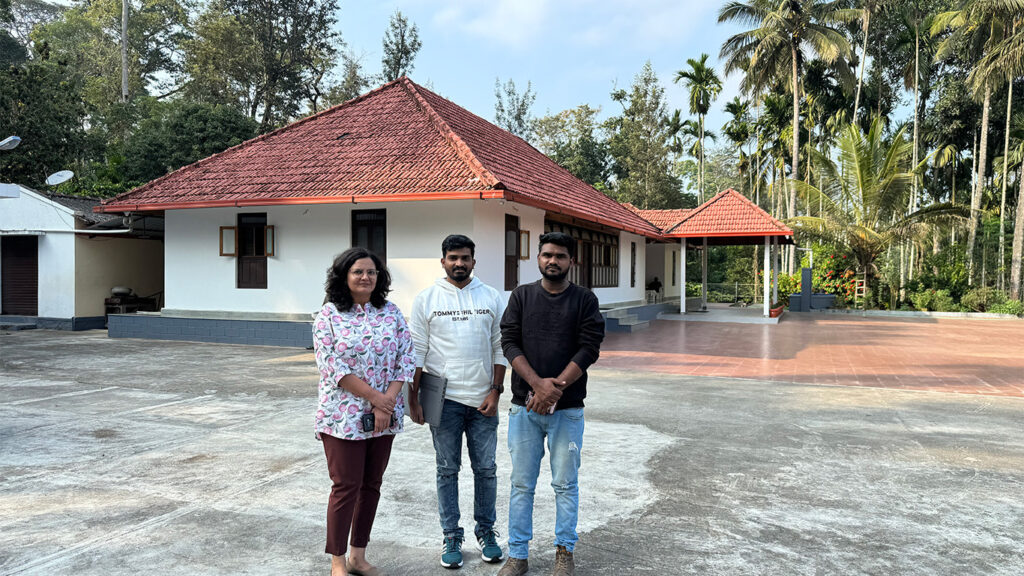
Team TRST01 in Action
Team TRST01 in action
Source
From Mystical Seeds to Colonial Plantations: A Bitter-Sweet Brew
- Legend of Baba Budan and smuggling coffee beans: “Coffee Production in India,” Wikipedia.
- Colonial impact on coffee plantations: “The Coffee Trade in India: A Historical Overview,” Economic and Political Weekly, 1984.
- Environmental consequences of deforestation: “Coffee Production and Deforestation: A Review of the Literature,” Environmental Conservation, 2013.
Monsoon Magic and the Green Revolution: A Symphony of Sustainability
- Monsoon’s impact on coffee flavor: “Monsooned Malabar: The Mystery of Aged Coffee,” National Geographic, 2016.
- Green revolution in Indian coffee: “Sustainable Coffee Production in India: Challenges and Opportunities,” Journal of Sustainable Agriculture, 2019.
- Reforestation efforts: “Coffee, Conservation, and Carbon Offsets: A Case Study from India,” Conservation Biology, 2012.
Beyond Arabica: A Kaleidoscope of Flavors and Eco-Consciousness
- Diversity of Indian coffee varieties: “Indian Coffee Varieties: A Comprehensive Guide,” The Indian Coffee Board, 2022.
- Organic farming and sustainability practices: “Organic Coffee Production in India: A Case Study,” International Journal of Sustainable Development & World Ecology, 2015.
- Fair trade initiatives: “Fair Trade Coffee in India: A Critical Analysis,” Journal of Business Ethics, 2017.
A Cup of Culture: More Than Just a Beverage, a Way of Life
- Cultural significance of coffee in India: “The Coffee Ritual in India,” Perfect Daily Grind, 2020.
- Regional coffee traditions: “A Brewtiful Journey: Exploring India’s Diverse Coffee Cultures,” National Geographic Traveller India, 2022.
- Social role of coffee in Indian communities: “Coffee Houses as Social Spaces in India,” Journal of Indian Anthropology, 2013.
The Future Brewing: Balancing Economic Growth and Ecological Harmony
- Challenges of balancing economic and environmental needs: “Coffee Production and Sustainability: A Balancing Act,” World Resources Institute, 2018.
- Innovative techniques in Indian coffee production: “The Future of Indian Coffee: A Look at Emerging Trends,” Specialty Coffee Association, 2023.
- Importance of sustainable practices for future coffee production: “Sustainable Coffee: A Guide for Consumers,” Rainforest Alliance, 2023.
Recent Comments
Recent Posts
- Driving Global Impact: Regulation, Technology, and Adoption July 14, 2024
- Blockchain Revolutionising Provenance Global Supply Chains July 11, 2024
- Supply Chain Innovation TRST01Chain June 18, 2024
- Blockchain for Sustainability June 14, 2024
- EUDR Coffee : Between the Cup and the Lip June 9, 2024
- EUDR and India Rubber Export May 25, 2024
- Data Driven Sustainability April 28, 2024
- Paradigm Shift in ESG April 14, 2024
- ESG Beyond the Reports March 21, 2024
- The Kenko Eggs A Case Study February 18, 2024
- New Frontier : Carbon Broader Adjustment Mechanism (CBAM) January 27, 2024
- Sustainable Transformation Future ESG Management January 21, 2024
- EUDR Compliance in Indian Trade January 7, 2024
- The Indian Coffee Story : Brewing Harmony December 16, 2023
- The Rubber Story : Between Growth and Sustainability December 10, 2023
- The 4R Strategy : Roadmap to Sustainable Growth December 3, 2023
- Sustainable Indian Coffee: A EUDR Perspective November 10, 2023
- Climate Tech and SDGs: Unlocking Potential October 21, 2023
- ESG Scorecards : TRST01’s Vision October 11, 2023
- The Imperative of Carbon Accounting October 8, 2023
- TRST01Chain on International Coffee Day October 1, 2023
- Footprint Lite – Embracing SME September 24, 2023
- Footprint ESG – Embracing Enterprise September 14, 2023
- Empowering Tomorrow: Innovation, Pivoting, and Sustainability at TRST01 August 27, 2023
- TRST01Chain for Scope 3 Reporting August 12, 2023




